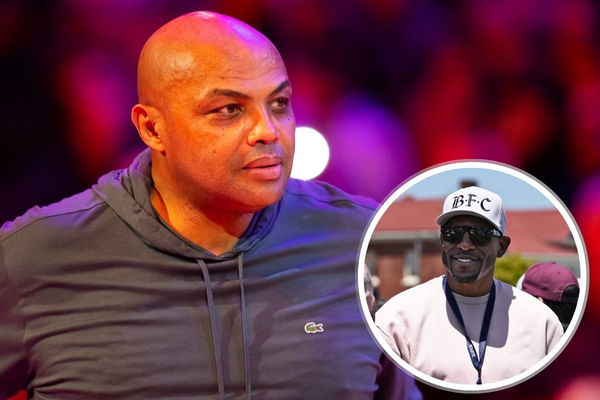

“I think it’s right for student-athletes to receive revenue… But the game and college athletics are not in a healthy spot. There needs to be change.” That’s how long-standing Virginia Cavaliers head coach, Tony Bennett, announced his unexpected departure just weeks before the season tipped-off. That clearly hinted at deeper concerns with recent NIL changes in college sports—a topic NBA great Charles Barkley has also criticized. With NIL still sparking heated debate, a National Basketball Players Association (NBPA) executive weighed in, offering an ambiguous, 50-50 perspective on college athletes earning money through NIL deals.
NBPA Executive Director, Andre Iguodala, joined the YouTube podcast Come and Talk 2 Me and was asked to share his take on the much-debated topic of NIL. He took that opportunity gracefully and said, “I do think kids should be paid,” recalling the financial hardships athletes had to suffer during their collegiate career, which included a “weekly expenditure of $5 on food.”
He also emphasized that college athletes have long been major revenue generators for their schools, often treated as “profit-entities” with little benefit for themselves. But everything shifted in 2021 when the NCAA lifted its long-standing restrictions on Name, Image, and Likeness (NIL) rights. This monumental change opened a floodgate of earning opportunities for young athletes, allowing them to leverage their talent and growing influence to finally earn from the fame they gain through their sport.
ADVERTISEMENT
Article continues below this ad
This shift has led to some athletes becoming millionaires before they even hit their 20s. Take 17-year-old Cooper Flagg, for example—his NIL value is already a staggering $2.6 million. While these opportunities are a huge win for talented, hard-working athletes, there’s also a downside. At such a young age, with their minds still developing, the pressure and responsibility that come with such wealth can have a potentially negative impact which Iguodala perfectly explained in the other perspective of his response.

USA Today via Reuters
Apr 23, 2023; San Francisco, California, USA; Golden State Warriors forward Andre Iguodala (center) gestures during the fourth quarter of game four of the 2023 NBA playoffs against the Sacramento Kings at Chase Center. Mandatory Credit: Darren Yamashita-USA TODAY Sports
“We’re asking these 19, 20-year-olds to make decisions that they should not be making and how others on the outside can take advantage of that,” he said before suggesting some thoughtful changes that could improve the current NIL structure to better protect young athletes.
“You set that money aside, put it in endowment form. You give them goals if you get drafted, sign a contract the money is accessible, if you get your degree the money is available to you, if you don’t, you got to wait till 30-35 (age). It’s like a trust like how we got a trust set up for our kids. It’s pretty simple and you’re setting them up, you know, to be responsible adults,” the former NBA star said on Come and Talk 2 Me.
He later reasoned his argument that many college athletes lack an understanding of the taxation system, which could lead to challenges when managing significant earnings at such a young age. Well, there is no doubt that with so much money suddenly available, handling finances responsibly could become a real struggle for teens.
What’s your perspective on:
Is NIL ruining college sports, or is it a necessary evolution for student-athletes' rights?
Have an interesting take?
While Iguodala still partially favored the NIL and only asked for changes, Charles Barkley has remained steadfast in his opposition to NIL, offering no support for the system at all.
Charles Barkley’s strong critique of NIL
“How did we become so bad as a society that we’re actually ruining college sports- one of the greatest way for most people in the world to get a free education?” Last year, Charles Barkley questioned every household, where people prioritized the money aspect of NIL over education. While it had already suggested his dissent against the system, he had expressed strong opposition this year as well.
“College sports is the only league in the world that doesn’t have a salary cap. That lets you know how sh-tty this situation is…Every league and every sport has a salary cap except college sports. That’s an unsustainable model to ask rich people, or your fanbase, to pony up millions of dollars every year,” Barkley didn’t hold back, making it clear he holds the NCAA responsible for the chaotic NIL landscape that’s taken over college sports.
The Philadelphia 76ers legend believes that NIL has become a bidding war for players. “And I don’t blame the kids cause listen, if they had to offer me millions of dollars, I’d be going to a certain school too,” he had said earlier while expressing his only disagreement and anger towards lawmakers.
ADVERTISEMENT
Article continues below this ad
Whether you agree with Charles Barkley’s firm opposition to NIL or not, it’s hard to ignore the thoughtful points raised by NBPA executive Andre Iguodala. His suggested changes could spark much-needed conversations if given a wider audience.
ADVERTISEMENT
Article continues below this ad
ADVERTISEMENT
ADVERTISEMENT
ADVERTISEMENT
ADVERTISEMENT


Is NIL ruining college sports, or is it a necessary evolution for student-athletes' rights?